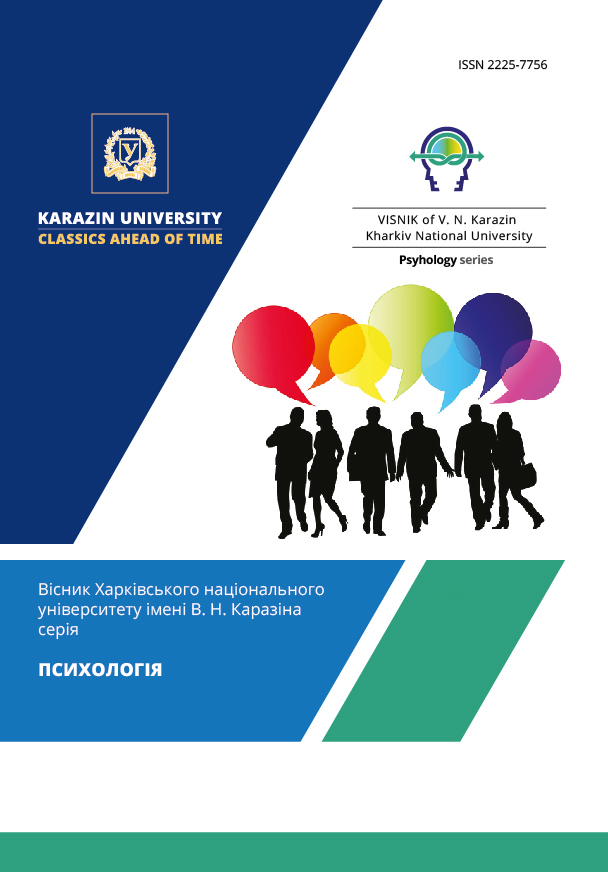Professional Self-Efficiency and Subjective Success of Managers at Different Levels
Abstract
The purpose of our work was to determine the characteristics of the relationship between professional self-efficacy and subjective success in managers of different levels who work in Ukrainian companies during the war in Ukraine. Managers of different levels (N=58) participated in the study, who were involved in the study through various online platforms. Among the subjects - 43 men and 15 women aged 27 to 56 years. Research methods: questionnaire, numerical scaling, questionnaire of professional self-efficacy ("Short occupational self-efficacy scale"), "Who am I?" method. M. Kuhn and T. McPartland. The managers under study have a high level of subjective success, which is moderately high and indicates the satisfaction of the subjects with their own achievements and behavior. The professional self-efficacy of the managers under study has a moderately high value. Managers clearly formulate goals in their work and feel motivated to overcome all obstacles that stand on the way to a certain result. The identity of different levels managers researched is presented as follows: in the first place there is the professional role position (leader, entrepreneur, manager and specialist), then - family affiliation and roles in the family (husband, father, son, brother), personal qualities (reliability, stability , justice, sincerity, diligence), characteristics of activity ("study an interesting topic", "make your friends happy") complete the list of friendship criteria, existential self, self-assessment of social skills, description of your physical data, citizenship, ethnic and gender identity. Managers who have a larger number of subordinates, are close to the head of the company, and have a high level of professional self-efficacy, are more likely to consider themselves completely successful.
Downloads
References
Abele, A. E., & Spurk, D. (2009). The longitudinal impact of self-efficacy and career goals on objective and subjective career success. Journal of Vocational Behavior, 74(1), 53–62. https://doi.org/10.1016/j.jvb.2008.10.005
Alon, R., Cinamon, R.G.. & Aram, D. (2021). Working adults' future occupational plans: the contribution of role characteristics. social support. and occupational self-efficacy. Int. J. Educ. Vocat. Guid. 24. 1-21. https://doi.org/10.1007/s10775-021-09496-x
Bandura, A. (1977). Self-efficacy: Toward a unifying theory of behavioral change. Psychological Review.
Guarnaccia, C., Scrima, F., Civilleri, A. et al. (2018). The Role of Occupational Self-Efficacy in Mediating the Effect of Job Insecurity on Work Engagement. Satisfaction and General Health. Current Psychology. 37(3). 488–497.⟨hal-01989834⟩
Kazakova, S.V. (2018). Peculiarities of self-efficacy of heads of vocational and technical education institutions as a psychological factor in the success of their professional activities. Visnyk pisliadyplomnoi osvity. Seriia: Sotsialni ta povedinkovi nauky. 6. P. 65-77. https://doi.org/10.32405/2522‐9931‐2018‐6(35)‐65‐77 [in Ukrainian]
Kredentser, O. (2021). Professional self-efficacy of personnel of educational organizations: theoretical analysis and empirical research. Organizational psychology. Economic psychology. 2-3(23). 64-76. https://doi.org/10.31108/2.2021.2.23.7 [in Ukrainian]
Krevska, O. (2018). Motivational factors of professional self-efficacy of an individual. (Candidate dissertation). Skhidnoievropeiskyi nats. un-t im L. Ukrainky. Lutsk. http://repository.ldufk.edu.ua/handle/34606048/27635 [in Ukrainian]
Lapteva, N. (2020). Psychometric analysis of the Ukrainian version of the professional self-efficacy scale. Psykholohichnyi zhurnal. 6(2). 164-172. https://doi.org/10.31108/1.2020.6.2.15 [in Ukrainian]
Muzyka, O.O. (2020). Psychological method "Professional self-efficacy profile of students (PPSS)" (Author's certificate № 100028). Ministry of Economy. [in Ukrainian]
Rigotti, T., Schyns, B. & Mohr, G. (2008). A Short Version of the Occupational Self-Efficacy Scale: Structural and Construct Validity Across Five Countries. Journal of Career Assessment. 16(2). 238–255. https://doi.org/10.1177/1069072707305763
Schyns, B. (2004). The Influence of Occupational Self-Efficacy on the Relationship of Leadership Behavior and Preparedness for Occupational Change. Journal of Career Development. 30(4). Р. 247–261. https://doi.org/10.1023/B:JOCD.0000025114.45945.08
Shanock, L.R. et al. (2019). Treating employees well: The value of organizational support theory in human resource management. The Psychologist-Manager Journal. 22(3-4). Р. 168 191. https://doi.org/10.1037/MGR0000088
Zhao, X., Bon-Gang, H., Jane, L. (2020). Job satisfaction of project managers in green construction projects: Constituents. barriers. and improvement strategies. Journal of Cleaner Production. 246. P. 118-168. https://doi.org/10.1108/ECAM-10-2018-0451




